Red Dead Redemption 2 somehow manages to be one of the most amazing video games I have ever played while also being one of the most frustrating. It is the victim of its own success: it does so much so well that its flaws are all the more noticeable.
[Note: spoilers abound in this post, so if you don’t want the game spoiled, go play it and read this later!]
But first let’s start with the positives. RDR2 is the biggest, most beautiful game I have ever played. The world is huge and intricately detailed, and no matter where you are, no matter what time of day it is, or what the weather is, it looks gorgeous. I recall reading something a few years back about video games and how graphics are good enough that the aim is no longer to exactly mimic reality, but instead to look better than reality, and RDR2 certainly does this. Like its predecessor, the ambiance of the game is one of its main strengths, and there were times when I would just pause to take in the sights. I mean, just look at some of these screenshots I found with a quick search:
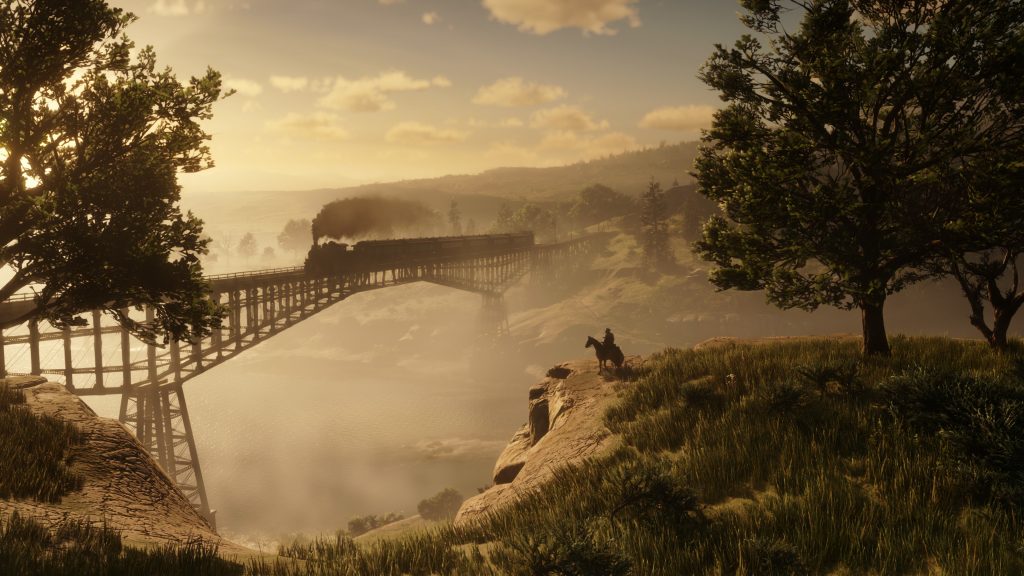
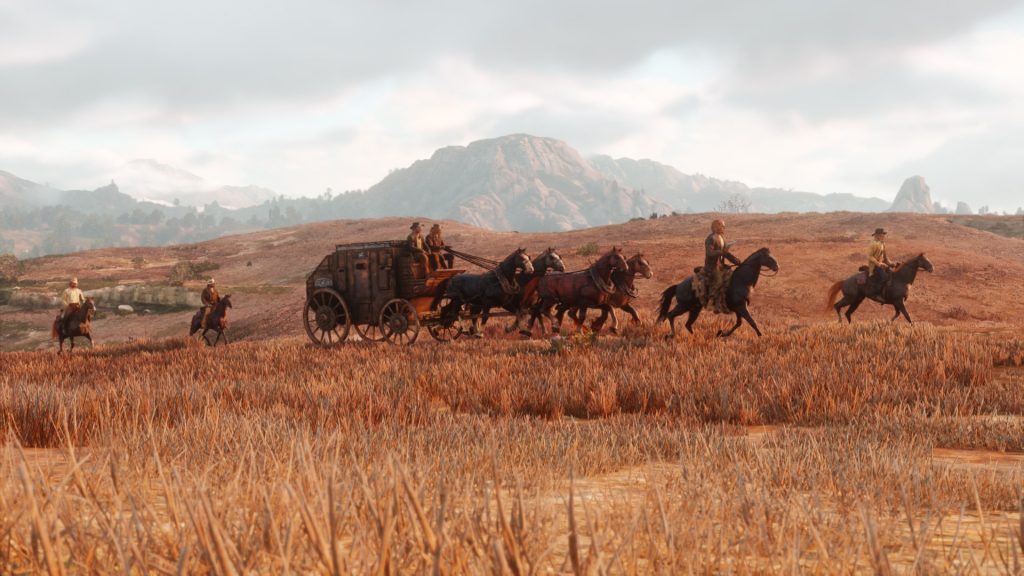
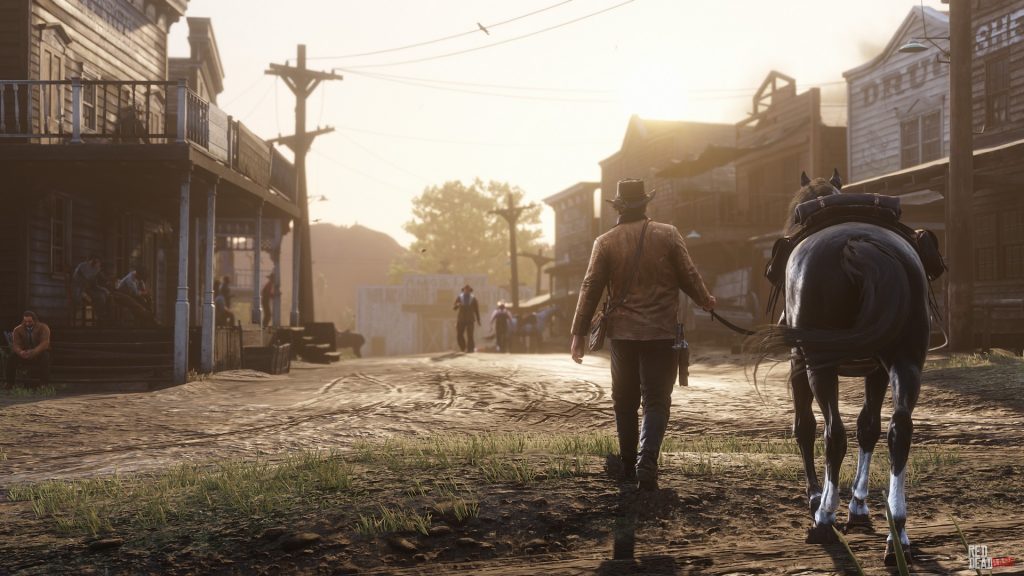
The world of RDR2 is a stylized version of the United States, and although the game is nominally a “western,” the map includes the desert southwest, the rockies, the Midwest, the deep South, and Appalachia. These regions blend seamlessly with each other and each has its own unique “feel” thanks to the changing geography, flora, fauna, and cities. If you’ve traveled the US at all, you can always recognize the real-world analog of where you are in the game. Through the course of the game, I talked to a guy panning for gold near Grand Teton, hunted a legendary wolf near Prismatic Spring in Yellowstone, picked wild orchids in the Louisiana bayou, found a mysterious skeleton in a snowy pass through the Rocky Mountains, and watched the sun rise over Sedona. And none of that was part of the main story of the game.
It’s not just the scenery that is amazing either. The game looks like a movie, with nearly every bit of dialogue well acted, and well “filmed” for lack of a better term. No artificial talking heads here, these are real scenes with genuine cinematography. The motion capture for the characters is excellent, and the characters themselves look great. The camera can get right in for a closeup and you rarely lose immersion due to graphics the way you might in games from just a few years ago.
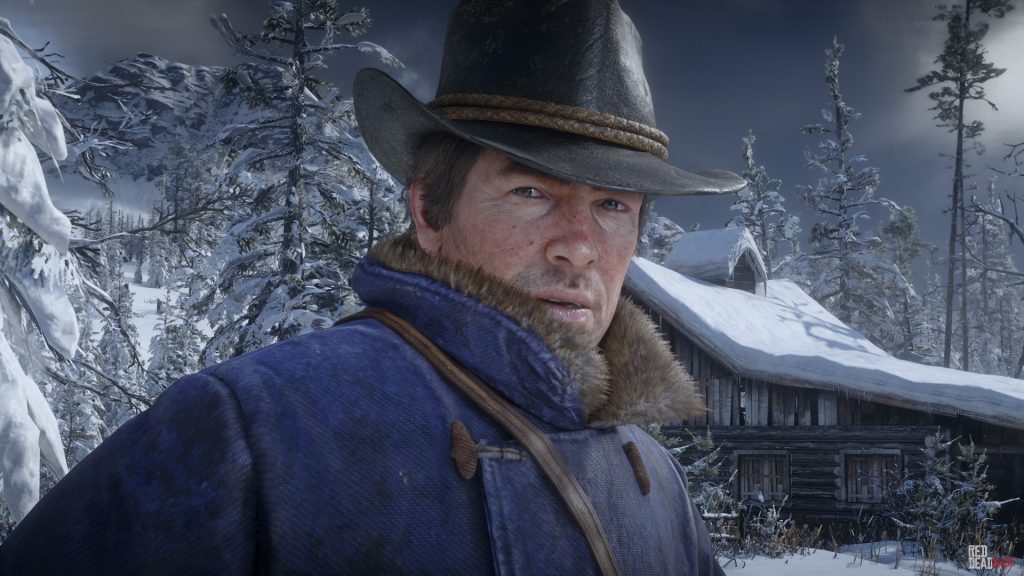
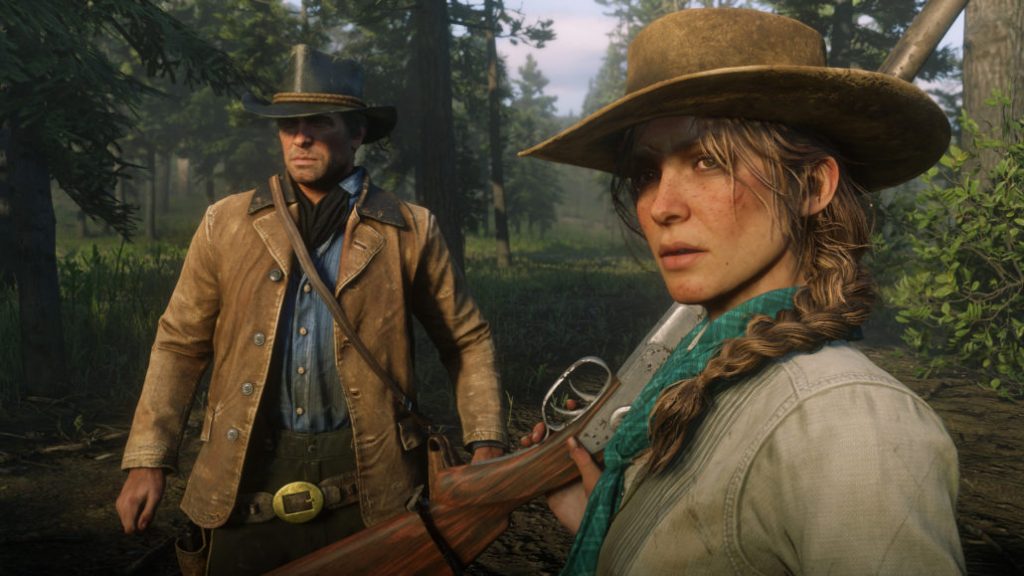
Not only do the characters look good, they’re also actual characters with personalities and backstories and well-written, well-acted dialogue to rival any western movie. In fact, I would go so far as to say that the characters and story in RDR2 are better than those in many western movies and novels I’ve seen/read. (This is not to say the story is flawless: more on that later.)
The story follows Arthur Morgan, second in command of a gang of outlaws led by the charismatic, loud-mouthed Dutch van der Linde. It begins with the gang on the run through the snowy mountains after a botched job in the town of Blackwater. They find a new place to set up camp and start trying to earn money through various legal and non-legal means.
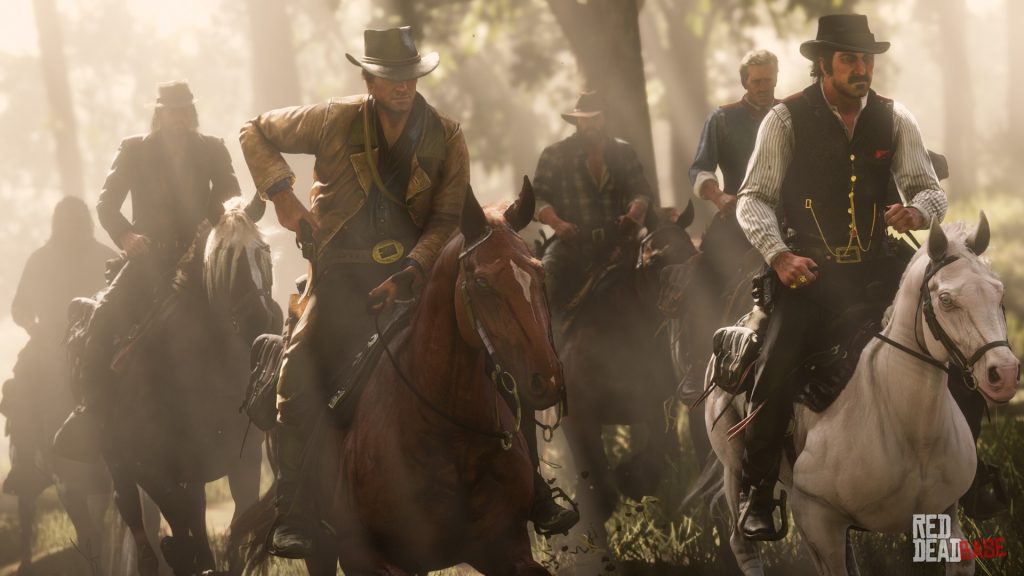
But tensions start to rise as the sleazy and reckless newcomer Micah Bell gains influence over Dutch, leading to a series of failed jobs and increasingly hare-brained schemes. Dutch loses his grip on sanity as the failures wear on him and Arthur begins questioning him after decades of loyalty.
At the same time, Arthur’s life of bad choices catches up with him. Early in the game he is collecting debts and beats a farmer who, it is revealed later, dies of tuberculosis shortly thereafter. Arthur learns that he caught the disease, and faces his own mortality in a way that is unexpected to someone who expected to someday die in a shootout. He has time to reckon with the good and bad that he has done in his life and the opportunities that he has sacrificed and friends he has lost because of his loyalty to Dutch.
Needless to say, video game plots have come a long way since the days of Bad Dudes on NES:
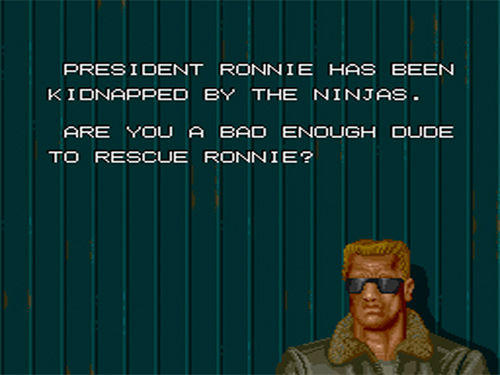
Red Dead Redemption is so excellent in so many ways that it ends up in a sort of uncanny valley between video game and movie, where it doesn’t fully succeed at being either one. Although the plot is excellent for a video game, and I would gladly read a novel or watch a movie with the same plot, it suffers because it has to serve double duty as a video game. I found it really jarring to go from beautiful, well-acted, cinematic cut-scenes, to the inevitable massive shootout against dozens of disposable henchmen. The actual shootout sequences end up seeming borderline slapstick compared to the real drama of the cut-scenes.
Similarly, the plot gets repetitive because it needs to find more and more excuses to have big video-game shootouts. So the gang tries repeatedly to do elaborate jobs and repeatedly fails and repeatedly has to go on the run again, and it quickly gets to the point where you wonder why in the world all these people are following Dutch when Arthur is clearly the more sensible one. And of course, that realization is what ends up being the culmination of the story, but it takes a long time and a lot of repetition to get there. This is because a video game the size of RDR2 needs dozens of hours of content in the main story, not the few hours of a good movie, so there’s a lot of padding and extraneous asides. In particular, the part of the story line involving Arthur trying to help a Native American tribe and Dutch trying to lead them into conflict with the Army as some sort of elaborate distraction made very little sense and was pretty clearly there to have more, and more varied, shootouts. Similarly, the unexpected detour involving a shipwreck in the Caribbean and a fight to help freed slaves against the brutal plantation owner/dictator there was a lot of filler (though it provided a beautiful change of scenery).
(I have conflicting feelings about how the game handles race in general and Native Americans in particular. I don’t feel qualified to speak much about it but I’ll say that I think the game’s heart is in the right place even as it uses some uncomfortable tropes and outright stereotypes.)
The flip side of the story suffering because it has to accommodate the video game aspects of RDR2 is that the game suffers too, to the extent that I actually think it is more successful as a “movie” than as a game. The game aspects suffer from several major flaws: bad controls and menus, lack of consequences, and lack of a compelling open world gameplay and progression.
First, the controls and menus: They’re really surprisingly bad. Because it tries to be a full-blown realistic wild-west simulator, there are a zillion things that you can do, and just as many controls to learn. Even after playing for 6 months, I still regularly struggle to remember what button does what in some circumstances. A lot of this is because new controls are inevitably introduced while there is some other action happening on the screen and are only shown on screen briefly before disappearing forever. Also, the same button sometimes does very different things in different contexts. For example, the button to look at something is the same button to shoot, which can lead to… bad outcomes.
If the controls are bad, the menus are terrible. They require you to hold down one button, then point in a radial direction with one of the control sticks, then potentially tap another button to choose among similar items, and then release the first button. It’s incredibly awkward. Meanwhile the game isn’t fully paused, just slowed way down. I think the idea was to keep it quick to avoid people getting buried in menus and thereby break the immersion of the game, but it’s much more distracting to use a poorly designed menu than it is to just pause, choose the item you want using simple, clear controls, and then get back to business. The inventory is clunky too, to the point that I essentially ignored it other than to occasionally check my Legendary Animals map.
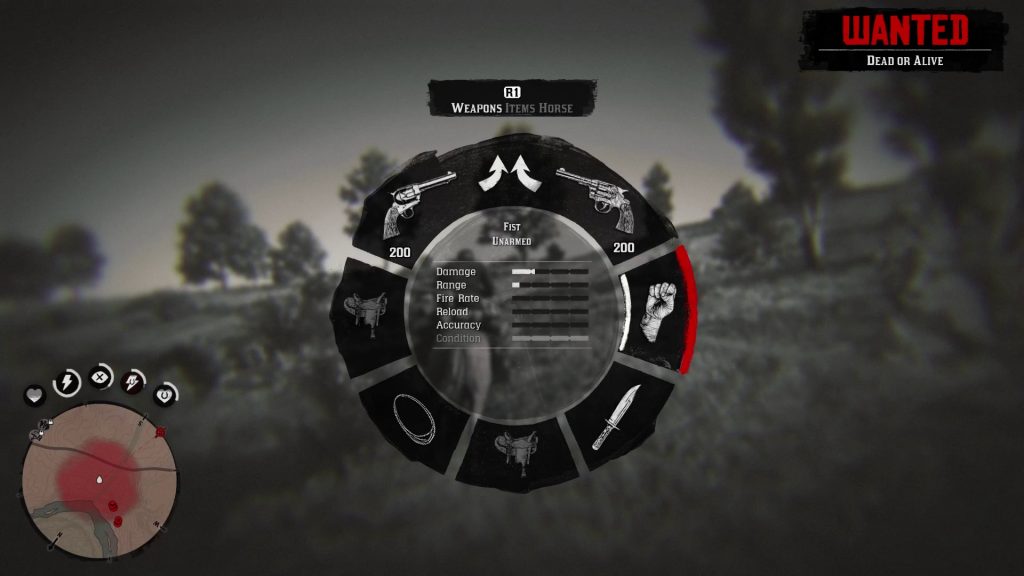
And that gets at the second major issue: lack of consequences. There are so many things that can just be ignored. You are warned early in the game that you need to eat often enough to stay healthy but not so much that you get fat. You are supposed to brush and feed your horse or it will suffer a loss of stamina. You can learn to cook a variety of fancy meals by combining meat from animals you hunt with various medicinal herbs you can gather. There are different special types of ammo you can learn to craft. You need to clean your guns to keep them in tip top shape. You’re supposed to donate money to the gang to pay for upkeep and provisions. You can craft all sorts of outrageous-looking outfits if you hunt the right animals. The list goes on and on and on, and basically none of it matters.
You don’t suffer any real penalty from eating too much or too little. The penalty to your horse for not keeping it clean is insignificant. There’s no reason to cook anything because even the most basic “stick meat over fire and then eat it” recipe refills all of your stats easily. The ammo crafting is a waste of time: sure I can make explosive bullets, but if I have to make them one at a time, and my sniper rifle can kill even the strongest legendary animals in a few shots, I don’t really need the explosive bullets, do I? Yeah, dirty guns don’t do as much damage, but it’s not that much of a penalty. The gang is perfectly fine if you donate precisely nothing to them. Those outfits you can craft look cool and/or silly but don’t change a thing.
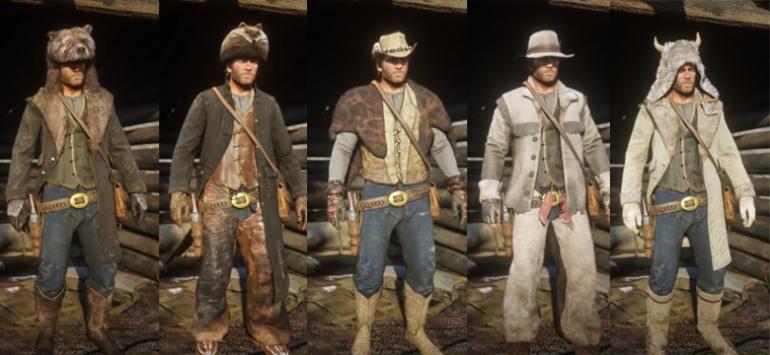
It seems like the game designers wanted the best of both worlds: they wanted the immersion of having to keep track of all these little things, but also didn’t want the player to get bogged down in all of them. I would much rather they had picked a few of these details and made them actually matter and ditched the rest.
This lack of consequences carries over into the game’s difficulty, or lack thereof. This is an incredibly easy game. It aims for you, you can enter slow-mo “dead-eye” mode and take out a half-dozen guys who already have you in their sights, and if your dead-eye meter or health runs low you’re basically guaranteed to be carrying enough miracle elixirs and snake oil to refill them indefinitely (another thing you theoretically need to care about but in practice doesn’t matter). Just about the only times I died in the game were when I (a) did something really stupid and deserved it, or (b) got confused about the controls. Confusing controls should not be the leading cause of death in a video game. I’m no elite gamer and I don’t mind a game being on the easy side, but a game should have a bit of a challenge and some stakes if you die and too often this one just… didn’t. Worst case, you lose a few bucks and respawn nearby.
And finally, the lack of a compelling open world gameplay or character progression. In this case, by character progression I don’t mean in terms of the story, but in terms of your abilities in the game. Other than getting a bit more stamina, health, and “dead-eye” time, you don’t really gain more abilities after the initial (lengthy) tutorial period where new controls and things are gradually doled out. The closest thing to new abilities that you get are new guns, but really a lot of these are window decoration. There are technically a whole bunch of guns in the game but in practice there are 5: pistol, repeater, shotgun, rifle, sniper rifle. The different types within each class don’t really matter much.
One of my greatest disappointments about RDR2 is that despite having such an amazing and beautiful open world, once you finish the main story there’s not that much to do in it. Or rather, there is a lot to do but it all feels like filler. Hunting is pretty fun for a while, and I liked the Legendary Animals, but I ended the game wishing I could spend more time in the game world, but unable to justify doing so because there was nothing meaningful to do.
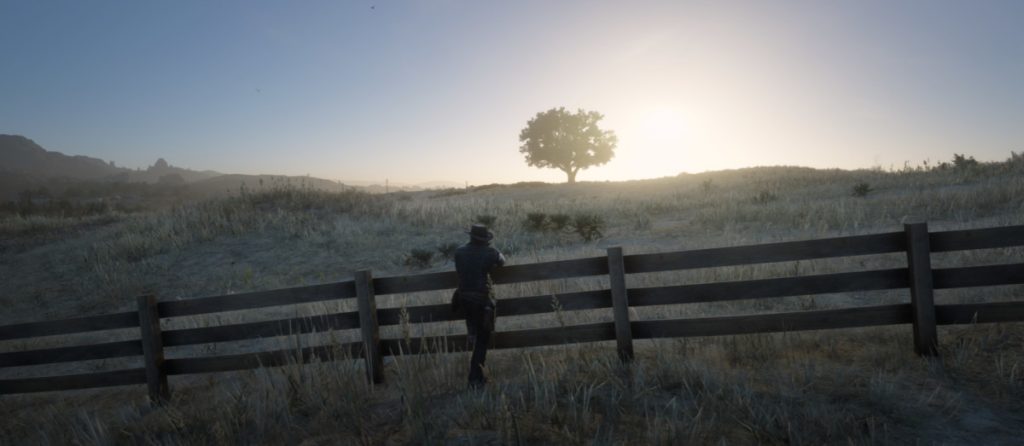
I’ve complained here a fair deal about one of the best-reviewed video games ever made (and I freely admit that it’s one of the best I’ve ever played despite my complaints). So what would I do differently to fix this? Aside from basics like “better controls and menus”, a lot of my complaints could be fixed by rearranging the plot.
One of the most compelling sequences in the plot is actually the epilogue, where you’re playing as John Marston and trying to set up a ranch and get away from the outlaw life to convince your wife and son to come back to you. It plays to the ambiance of the game and by cutting down on the outlandish firefights in favor of more character development, it’s stronger than much of the main story line.
In my fantasy version of the game, this sequence is moved to the early part of the game. You would begin the game as a teenage kid with no skills whatsoever, orphaned and heading west to build a life. You find work, develop skills, and eventually start a family and ranch of your own. But paying the bills gets harder and harder and as you discover that you’re good in a fight you start making money by collecting bounties. At this point, you meet up with Dutch and join his gang, trying to live a double life as a family man and as a gang member. You build loyalty to Dutch as the gang protects your family from some other outlaws, but eventually the dual life collapses and your family leaves (or is killed?), so you end up in Dutch’s gang and fiercely loyal. From here, the main plot of the game can proceed. There’s more justification for the long time it takes to realize the loyalty to Dutch is misplaced.
The epilogue with John Marston can still work: he inherits Arthur’s ranch, run-down after years of neglect. After the credits roll, the ranch provides the reason to keep playing. You can build new upgrades and customize it to your heart’s content if you earn money by continuing to play (in this scenario you would not end up with vast sums of money after the end game). I’m picturing full-out customization, similar to the base-building in Fallout 4. (Likewise, in general I’d love to see the introduction of more unique weapons and clothing that actually have impacts on the gameplay, again similar to Fallout 4.)
Anyway, those are my (waaay too long) thoughts on Red Dead Redemption 2. It was excellent in a lot of ways but that just made its shortcomings all the more frustrating. It’s been a couple of weeks since I stopped playing and I still have that sad feeling you get when you finish a really immersive novel. I sincerely wish I had more of a reason to keep playing around in the gorgeous world of the game. In any case, despite my complaints, the success of RDR2 makes me optimistic about the future of story-heavy gaming. If RDR2 is a sign of things to come, I’m looking forward to what the future of gaming holds.
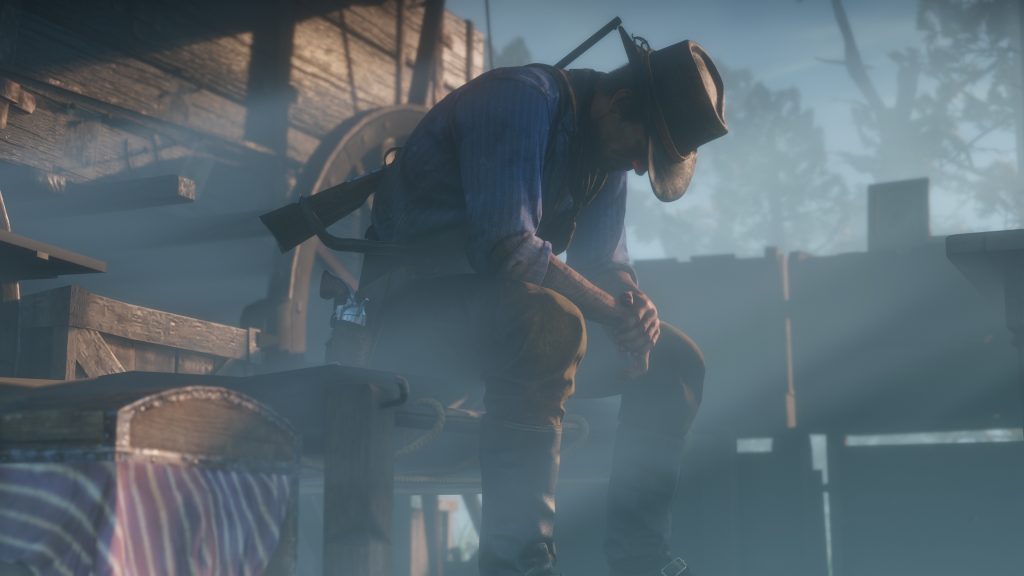

I’m very excited to see your thoughts when you eventually play Zelda Breath of the Wild. It has a pretty compelling reason to explore the world finding shrines, very good controls, some RPG style progression of new abilities over time, the story is good although it is ultimately a Ganon is bad let’s stop him plot.
Yeah, I’m looking forward to it! One thing Nintendo almost always does very well is controls. I’m very interested to see a Zelda game that incorporates open-world and RPG mechanics. Just waiting for kids to be old enough to play it with them.
Great review.
I’m at the point in my life where I’m probably getting more enjoyment watching a no commentary walkthrough for a lot of games rather than actually playing it. But I also don’t have 100+ hours to watch the whole thing.
I may look up a cut of all the cinematics, and see how I like it as a movie.
On the running and gunning: I guess at some level there’s only so much talking you can do in a game before it simply becomes a different kind of game. There are amazing combat games, and amazing narrative games. Maybe it inevitably will lose something trying to straddle those in order to be a AAA game. I don’t know whether these are design choices or compromises.